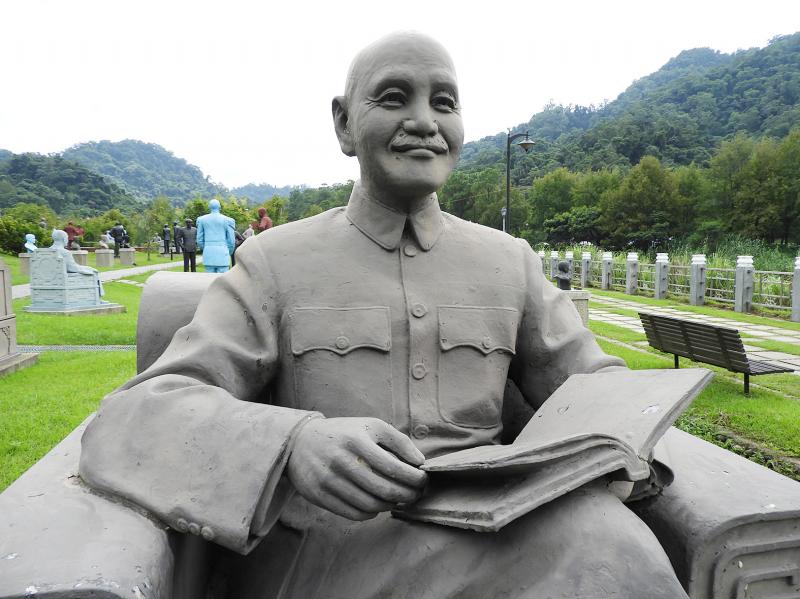Taiwan is still full of reminders of the authoritarian era under Chiang Kai-shek (蔣介石) and his son Chiang Ching-kuo (蔣經國), with a total of 1,814 sites, monuments and office spaces named in memory of them, an average of one for every 20km2 in the nation, a Transitional Justice Commission report released on Friday said.
Taiwan has 1,235 monuments, statues, sculptures and large-frame portraits commemorating the two Chiangs, commission Chairwoman Yang Tsui (楊翠) said, adding that of those, 511 fall under the central government’s jurisdiction, and only 54 have been removed or renamed.
There are also 579 memorial sites and office spaces named in remembrance of them.

Photo: Chen Yu-fu, Taipei Times
Excluding the 227 statues of Chiang Kai-shek and two of Chiang Ching-kuo at the Cihu Memorial Sculpture Park in Taoyuan’s Dasi District (大溪), there are 848 statues of Chiang Kai-shek in Taiwan, of which 511 belong to local governments and 337 belong to the central government, the report said.
Taipei has the most statues of Chiang Kai-shek at 129, followed by Taoyuan at 112 and Taichung at 98, it added.
For those under the central government’s jurisdiction, most of the statues dedicated to the two Chiangs are located in agencies under the Ministry of National Defense, the Veterans Affairs Council and the Ministry of Education, the report found, adding that they have 276 in total, or 82 percent.
The three ministries also have the highest number of office spaces and sites dedicated to the two Chiangs at 143, or 89 percent.
Of the 419 statues, office spaces and sites, only five have been removed or repurposed, and that was mainly done by universities, commission Deputy Chair Yeh Hung-ling (葉虹靈) said, adding that as the military and other schools have differing views on the removal of statues or monuments of the two Chiangs, discussions with the three ministries are ongoing.
“There are many ways to handle these reminders of Taiwan’s authoritarian past, including removing them, repurposing them into open public sites or spaces for the arts ... while moving them to be stored at a warehouse is also another option, or transferring them to cultural parks,” said Yang, adding the commission would continue to keep track of how the government agencies are dealing with the matter.

A magnitude 5.6 earthquake struck off the coast of Yilan County at 12:37pm today, with clear shaking felt across much of northern Taiwan. There were no immediate reports of damage. The epicenter of the quake was 16.9km east-southeast of Yilan County Hall offshore at a depth of 66.8km, Central Weather Administration (CWA) data showed. The maximum intensity registered at a 4 in Yilan County’s Nanao Township (南澳) on Taiwan’s seven-tier scale. Other parts of Yilan, as well as certain areas of Hualien County, Taipei, New Taipei City, Taoyuan, Hsinchu County, Taichung and Miaoli County, recorded intensities of 3. Residents of Yilan County and Taipei received

Taiwan has secured another breakthrough in fruit exports, with jujubes, dragon fruit and lychees approved for shipment to the EU, the Ministry of Agriculture said yesterday. The Animal and Plant Health Inspection Agency on Thursday received formal notification of the approval from the EU, the ministry said, adding that the decision was expected to expand Taiwanese fruit producers’ access to high-end European markets. Taiwan exported 126 tonnes of lychees last year, valued at US$1.48 million, with Japan accounting for 102 tonnes. Other export destinations included New Zealand, Hong Kong, the US and Australia, ministry data showed. Jujube exports totaled 103 tonnes, valued at

BIG SPENDERS: Foreign investors bought the most Taiwan equities since 2005, signaling confidence that an AI boom would continue to benefit chipmakers Taiwan Semiconductor Manufacturing Co’s (TSMC, 台積電) market capitalization swelled to US$2 trillion for the first time following a 4.25 percent rally in its American depositary receipts (ADR) overnight, putting the world’s biggest contract chipmaker sixth on the list of the world’s biggest companies by market capitalization, just behind Amazon.com Inc. The site CompaniesMarketcap.com ranked TSMC ahead of Saudi Aramco and Meta Platforms Inc. The Taiwanese company’s ADRs on Tuesday surged to US$385.75 on the New York Stock Exchange, as strong demand for artificial intelligence (AI) applications led to chip supply constraints and boost revenue growth to record-breaking levels. Each TSMC ADR represents

TRUST: The KMT said it respected the US’ timing and considerations, and hoped it would continue to honor its commitments to helping Taiwan bolster its defenses and deterrence US President Donald Trump is delaying a multibillion-dollar arms sale to Taiwan to ensure his visit to Beijing is successful, a New York Times report said. The weapons sales package has stalled in the US Department of State, the report said, citing US officials it did not identify. The White House has told agencies not to push forward ahead of Trump’s meeting with Chinese President Xi Jinping (習近平), it said. The two last month held a phone call to discuss trade and geopolitical flashpoints ahead of the summit. Xi raised the Taiwan issue and urged the US to handle arms sales to